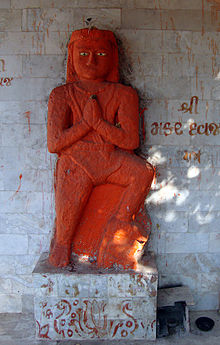Makaradhwaja: Difference between revisions
mNo edit summary |
Good faith edits→ not known as Hindu Legend, added wikilink |
||
| Line 1: | Line 1: | ||
[[File:Makardhwaja.jpg|thumb|Makardhwaja (Temple at Odadar village - Porbandar, Gujarat, India)]] |
[[File:Makardhwaja.jpg|thumb|Makardhwaja (Temple at Odadar village - Porbandar, Gujarat, India)]] |
||
'''Makardhwaja''' as per Hindu |
'''Makardhwaja''' as per [[Hindu Mythology]], is son of [[Hanuman]], who makes his appearance in epic [[Ramayana]].<ref name=a>[http://www.dlshq.org/religions/hanuman.htm] SRI HANUMAN By SRI SWAMI SIVANANDA</ref><ref name=b>[http://www.lordhanuman.info/index.php/lord-hanuman-and-makardhwaja-his-son/ Lord Hanuman and Makardhwaja, his son]</ref> |
||
==Birth== |
==Birth== |
||
Revision as of 11:38, 15 October 2013

Makardhwaja as per Hindu Mythology, is son of Hanuman, who makes his appearance in epic Ramayana.[1][2]
Birth
When Hanuman took a dip in the waters of sea, after burning whole of Lanka with the fire burning on his tail, a drop of his perspiration fell in to mouth of a mighty fish. Out of this the Makardhwaja was born.[1][2][3]
According to another, slightly different version, when Hanuman took a dip in sea, for cooling himself after burning Lanka; a drop of his seed got discharged, due to extreme heat generated in his body and labor by him, which fell in to mouth of a giant fish-cum-reptile like creature, whose name was Makardhwaja, thus making it pregnant.[4]
The fish was caught by people of Ahiravana, who ruled Patala, the nether-world. The Markardhwaja, was discovered, when stomach of fish was cut open and named after it. Ahiravana, seeing his strength & virility gave him job of guarding, the gates of his Kingdom.[1][2][4]
Story in Ramayana
When Ahiravana took Lord Rama and Lakshmana to Patala, Hanuman followed them to their rescue. He was challenged at the gate of Patala by a creature, who was part Vanara and part reptile - a Makara. He introduced himself Makaradhwaja ( sometimes also spelled as Magar-dhwaja ) and son of Hanuman, the mighty warrior.[1][2] Makardhwaja name is derived from Hindu mythological creature Makara.
Hanuman was amused and said that, I am myself the Hanumana but he could not be his son, as he was born celibate. However, Hanumana then closed his eyes in dhyan to see the events described above of Makardhwaja's birth.
Makardhwaja asked him for his blessings, however, he said to Hanuman, that he will have to fight him to enter Patala, as he cannot betray Ahiravana, his mentor. Hanuman defeats Makaradhwaja in a duel and binds him to proceed further to ultimately kill Ahiravana and rescue Rama & Lakshamana.[1][2]
Later on, upon Rama's advice he installed Makardhwaja, as King of Patala before returning to Lanka, to continue war with Ravana.[1][2]
Thai Ramayana
In the Southeast Asian Ramayana a variation is present, that Ravana had a daughter named Suvannamaccha who was half fish half human, was sent to thwart the Vanaras from making bridge across the sea. But instead as that version goes Hanuman and Suvannamaccha are attracted and make love, which result in birth of a son named Macchanu.[5][6]
Kshatriya clan Jethwa
The Jethwa clan of Kshatriyas claim their descent from Makardhwaja. As per folk tales of their clan, Makardhwaja had a son named Mod-dhwaja and he had a son named Jethi-dhwaja. Jethwas claim descant from Jethi-dhwaja and worship Hanuman as their Iṣṭa-devatā. The Jethwa dynasty of Porbandar, therefore, had the image of Hanuman on their Royal flag.[4]
See also
References
- ^ a b c d e f [1] SRI HANUMAN By SRI SWAMI SIVANANDA
- ^ a b c d e f Lord Hanuman and Makardhwaja, his son
- ^ Is Science doing a Makardhwaj?
- ^ a b c Shree Kutch Gurjar Kshatriya Samaj: A brief history & glory of our fore-fathers: Section : History of Rajput Surnames, Their origin and Myths : Sub-section : History of Jethwa : by Raja Pawan Jethwa, Calcutta (2007).Page 81.
- ^ The Ramayana and the Malay shadow-play by Amin Sweeney, Vālmīki. Penerbit Universiti Kebangsaan Malaysia,. 1972. pp. 238, 246, 440.
{{cite book}}: CS1 maint: extra punctuation (link) - ^ Śrīrāmakīrtimahākāvyam: Thāirāmakathāmāśritya praṇītamabhinavaṃ Saṃskr̥tamahākāvyam by Satyavrat Sastri. Mūlāmala Sacadeva Pratiṣṭhānam. 1990. pp. xvi, 224, 282.

